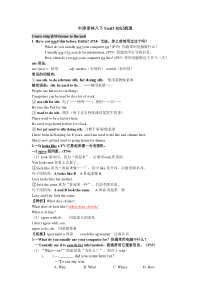 DOC
DOC
【文档说明】牛津译林八年级下Unit3知识梳理学案.docx,共(6)页,27.640 KB,由管理员店铺上传
转载请保留链接:https://www.doc5u.com/view-d2b3bc732f54170bdf4487541a200ab0.html
以下为本文档部分文字说明:
牛津译林八下Unit3知识梳理Comicstrip&Welcometotheunit1.Haveyouusedthisbefore,Eddie?(P34)艾迪,你之前使用过这个吗?Whatdoyouusuallyuseyourcomputerfor?(P35)你通常用电脑做什么?Ius
uallyuseittosearchforinformation.(P35)我通常用它寻找信息。Howoftendoyouuseyourcomputerforthis?(P35)你用电脑做这个多久一次?u
se用法:use/ju:z/v.使用adj.useless(无用的)useful(有用的)常见的词组有:①usesth.todosth=usesth.fordoingsth.使用某物做某事被动语态:sth.beusedtodo...……被用来做……Peopleu
seknivestocutthings.Computerscanbeusedtodoalotofwork.②usesthforsth.为了……使用……;使用……以……HeusesthePadforfun.③use
dtodosth.曾经(用于过去持续或经常发生的事)Thereusedtobeafactoryhere.Heusedtogohomebefore8o’clock.④be/getusedtosth/doingsth.习惯于某事/做某事Ihavebeeni
nNanjingfor8years,andIamusedtothelifeandclimatehere.Sheisnowgettingusedtogoinghomefordinner.2.—ItlookslikeaTV.它看起来像一台电视机。—I
agree.我同意。(P34)(1)look系动词,意为“看起来”,后面常+adj.作表语。Youlooktired.你看上去累了。①looklike意为“看起来像……”,其中like是介词,后面常跟名词。句子结构为:Alooksl
ikeBA看起来像BLucylookslikehermother.②lookthesame意为“看起来一样”,后面不跟宾语。句子结构为:AandBlookthesameA和B看起来一样LucyandLilylookthesame.【辨析】Whatdoessblike?Whatdoessbl
ooklike?=Howdoessblook?Whatissblike?(2)agreewithsb.同意某人的意见Idon’tagreewithyou.agreetodosth.同意做某事【拓展】agreementn.同意reachtheag
reement达成共识3.—Whatdoyouusuallyuseyourcomputerfor?你通常用电脑干什么?—Iusuallyuseittosearchforinformation。我通常用它搜索信息。(P35)(1)“What…for?”的意思是“为什么?”,相当于why。()
---_______didyoucomeherefor?---Toseemyson.A.WhyB.WhatC.WhereD.How(2)searchsb.搜身searchsp.对某地进行搜查searchfor寻找……(=lookfor)search
...for...在……搜寻……Shesearchedforherlostcateverywhere,butshefailed.TheenemysearchedthemountainfortheRedAr
my,buttheyfailed.Thepolicemanissearchingeveryoneforthediamond.Reading1.Welcometo“AroundtheWorldinEightHours”.(P36)欢迎来到“8小时环游世界”。(1)welcome的用法:
int.欢迎(光临)WelcomebacktoChina!vt.欢迎Themayorwelcomedthevisitingguestsattheairport.市长到机场欢迎来宾。adja.受欢迎的;令人愉快的Sheisawelcomevisitor.b
.被允许的,可随意使用的Youarewelcometostay.n.欢迎,款待;欢迎辞Hereceivedawarmwelcomeinourschool.他在我们学校受到了热烈的欢迎。(2)in+一段时间一段时间之后Myfathe
rwillcomebackinaweek.(一周后)Howsoonwillyourfathercomeback?在一段时间之内(=within)Icanfinishtheworkin2hours.(两小时之内)2.Justclick
onit,andyoucanvisitAsia,Africa,Europe,andmoreinonlyeighthours.(P36)只要点击它,你就可以只在8小时之内参观亚洲,非洲,欧洲甚至更多国家。句型:(1)祈使句,+and+肯定陈述句(2)祈使句,+or+
否定陈述句Workhard,andyou’llgethighgrades.→Workhard,oryouwon’tgethighgrades.Hurryup,orwewillbelate.→Ifyoudon’thurryup,wewillbelate.3.WallS
treet,theworld-famoustradecenter,ishereatthesouthernendofManhattanIsland.(P37)华尔街,闻名于世的贸易中心,位于曼哈顿岛的最南端。(1)theworld-famo
us由名词和形容词加连字符-组成的复合形容词,可以由名词所有格来代替:theworld-famoustradecenter=theworld’sfamoustradecenter再如:Theycanbuildthebridgeintwo-daytime.=Theycanb
uildthebridgeintwodays’time.(2)atthesouthernendof…在……的南端attheendof.....在....的尽头、末尾后接时间、地点名词这个月末attheendofthismonth在路的尽头attheendofthe
roadbytheendof在……结束的时候后接时间4.FurtheronisTimesSquare.(P37)再往前走就是时代广场。倒装句:谓语动词提到主语之前。further为副词,副词或者介词短语开头的句子可以用倒装来起强调作用。Apicturehang
sonthewall.→Onthewallhangsapicture.介词短语谓语主语5.Itisexcitingtoseethehugeglassballfallingthroughthedarkness.(P37)看巨大的玻璃球在黑暗中落下
真实太让人兴奋了!(1)Itis+adj+todosth.做某事是…的Itisinterestingtodohomeworkandatthesametimelistentomusic.(2)see…doing…看见……正在做某事see此处为感官实义
动词,其用法有两种:see.sb.doingsth看见某人正在做某see.sb.dosth看见某人经常做某事或者做过某事Isawherentertheroom.我看见她进了房间。(看完了整个过程)Thelittlegirloft
enseethemanrunalongtheriver.(经常性)WhenIwentpasttheroom,Isawagirldancinginit.(正在进行)类似的动词还有hear/watch/notice(3)fall的常见词
组:falldown从……掉下falloff跌落fallasleep睡着6.Withseverallakes,hillsandalargegreenlawn,it’sagoodplacetorelaxafterahardday’swork.(P37)公园内有几片湖水。几座小山
记忆一大片绿草坪,是人们辛苦工作一天后放松的好去处。(1)withprep.有,用,带着此处的withseverallakes,hillsandalargegreenlawn为介词短语,起副词作用,意思是“带有,伴随”。Withasmi
leonhisface,hecameintotheclassroom.他面带微笑进入了教室。(2)severaldet.做限定词用,意为“几个,数个”,多用于指人或物,是一个不精确的数量,多于两个但不是
太多,后接可数名词的复数形式。Ihadlivedtwodoorsawayfromthisfamilyforseveralyears.hardwork与workhard有何区别?hardwork为名词短语,意为“艰苦的工作”;workhard为动词短语,意为“努力地工作
”。Thisishardwork,butheworkshard.7.Haveyoueverheardofthesong“Memory”?(P37)你曾经听说过“Memory”这首歌吗?hearvt.听到,听见常
见短语:hearfromsb.收到某人的来信=receivealetterfromsb.hearof听说过,听到;提起某事,直接指其对象。Ihaveneverheardofhimsinceheleft.Ihaveheard
ofthesong.hearabout听到/得知关于某人或某事的消息,比hearof知道的更详细,具体。I'vejustheardabouthisillness.I'vejustheardabouthispromotion(提升).
8.musical:aplayfilledwithmanysongs(1)musicaladj.音乐的;悦耳的musicaltalent音乐天赋musicalstyles音乐风格n.音乐剧(2)aplayfilledwithmanysongsfilled
withmanysongs是过去分词作后置定语,表示动宾关系,即表被动。9.NewYorkisalsocalled“thebigapple”.(P39)被动语态:becalled是“be+动词的过去分词”结构,这一结构表示被动10.gatherv.聚集gathered-gathered-gat
heringgathersGrammar1.differencesbetweenthetwodifferencen.不同makeadifference(to)differentadj.不同的bedifferentfro
mthesameas2.IvisitedthePalaceMuseumwithmygrandparentstheotherday.theotherday是一般过去时的标志词3.Luckyyou!相当于“Youaresolucky.”luckn.Goodlucktosb.祝某人好运。4.Mydad
hasjustreturnedfromtheUSA.(P42)我爸爸刚从美国回来。returnv.返回,回来=comeback瞬间性动词,若换为延续性动词,需改为beback—Hasyourdadret
urned?—Yes,hehasbeenbackfortwodays.Myfatherhasjustreturned.=Myfatherhasjustcomeback.Integratedskills,StudySkills&Task1…youca
nalsofindotherinformationaboutthecity.(P43)你也可以发现有关这座城市的其他信息。find,findout和discover区别(1)find意为“找到;发现”,指找到或发现自己所需要的东西或丢失的东西,着重指找到的结果。They
finallyfoundaway.(2)findout指经过研究或询问查明某事或真相。I'vefoundyououtatlast.PleasefindoutwhentheshipsailsforNewYork.(3)discover意为“发现”,表示“偶然”或“经过努力”发现客观存在的事物、真理
或错误,即指发现原来客观存在但不为人所知的事物,也可表示发现已为人所知事物的新的性质或用途。ColumbusdiscoveredAmericain1492.2.Wouldyoumindshowingmehowtostartthisonlinetour?(P44)mindv.介意,反对(1
)mindsb.doingsth./mindone'sdoingsth.介意某人做某事Wouldyoumindmyopeningthewindow?=Wouldyoumindmeopeningthewindow?如果回答“不介意”:No,ofcoursenot=Certainlynot.
或“Goahead(去做吧)”。如果回答“介意”:You’dbetternot.(2)mindn.理智,精神;意见;智力;记忆力常用短语有:changeone'smind改变主意makeupone'smind下定决心keepinmind记在心里onon
e’smind挂在心上;惦念What’sonyourmind?你在想什么?()①-It'ssohotintheclassroom.Wouldyoumind_______thewindows?-OK.I'lldoitrightnow.A.notcloseB.notopeningC.
closingD.opening()②-DoyoumindifItaketheseat?-_______.Anyonecantakeit.A.BetternotB.NevermindC.OfcourseD.Mypleasure3.Mypl
easure.(P44)不用谢。“It'smypleasure.”“Mypleasure.”和“Withpleasure.”区别。(1)"It'smypleasure.”相当于“Mypleasure.”,用在做某事之后,意为“没关系,不用谢”。-Thanksforhelpingme!-My
pleasure./It'smypleasure.(2)"Withpleasure.”用在做某事之前,意为“很乐意,愿意效劳”。-Canyougivemeaglassofwater?-Withpleasure.愿意效劳。()①-Thanksfortellingmethe
truth.-_______.A.Mypleasure.B.That'sright.CWithpleasure.D.Pleasure.()②-Canyoulendmeyourbike?-_______.A.Mypleasure.B.It'spleasu
re.CWithpleasure.D.Pleasure.4.ItismadeupofEngland,Scotland,WalesandNorthernIreland.(P47)它由英格兰、苏格兰、威尔士和北爱尔兰组成。bemadeupof由……组成Theteam
ismadeupoftenpeople.这个团队由十个人组成。bemadeupof的同义短语为consistofThebookismadeupoffiveparts.=Thebookconsistsoffiveparts.【语法讲堂】现在
完成时VS一般过去时一般过去时和现在完成时有何区别?(1)一般过去时表示过去某个时间发生的事、存在的状态或经常发生的动作。说话的侧重点只在于陈述一件过去的事情,不强调对“现在”产生的影响。HevisitedGuilinin1998.他1998年参观过桂林。(只说
明去桂林的时间)(2)现在完成时表示动作发生在过去,对现在造成了影响或产生了结果,不与确定的过去的时间状语连用。Jillhasboughtanewcomputer.吉尔买了一台新电脑。(着重点是现在有了一台新电脑)(3)两种时态构成形式上的区分。①一般过去时的谓语动词用
过去式,而现在完成时的谓语基本构成是“助动词have/has+动词的过去分词”。Thefilmstartedat70'clock.电影在7点钟开始的。Hehasbeenateacherformanyye
ars.他已经做教师许多年了。②一般过去时通常与表示过去的时间状语连用。如:yesterday,lastweek,twoyearsago,justnow,in2002等;而现在完成时则常与just,already,ever,never等副词和thesedays,thi
sweek,since…,for…等表示一段时间的状语连用。③现在完成时强调的是与现在的关系,如对现在产生的结果或影响等,属于现在时范畴,谈论的是现在的情况。而一般过去时只表示动作在过去某一时刻发生,不表示和现在的关
系,现在情况可能已发生变化。Whoopenedthedoor?谁开的门?(只强调过去开门这一动作,门现在可能已关上)Whohasopenedthedoor?谁把门开了?(强调门现在依然还开着)现在完成
时不能与明确的过去的时间状语连用。如:threedaysago,lastyear,yesterday,lastSunday,in2008等等。如句中有以上这些明确的过去的时间状语,应用一般过去时。另外,过去发生的一个
动作,现在情况已经发生了变化,也应用一般过去时。[注意]如果这些过去的时间状语前面有since,表示“自过去某一时间一直延续到现在”,应用现在完成时。Hefinishedreadingthebookthedaybeforeyesterday.他前天看完了这本书。Mycousinha
sbeeninNanjingsince2009.我的堂妹自从2009年就在南京了。④现在完成时不与when引导的特殊疑问句连用,when后面只用一般过去时表示已发生的动作。但现在完成时可与where,why等疑问词连用。Whendidthetrainlea
ve?火车是什么时候离开的?()When_____you_______yourdictionary?A.did;loseB.has;lostC.will;loseD.does;loseKeys:A⑤sin
ce引导的时间状语从句,后面的从句用一般过去时,只有前面的主句才用现在完成时。Wehaveknowneachothersincewecametotheschooltwoyearsago.自从两年前来到学校我们就互相认
识了。⑥有些时间状语,如thismorning,thismonth,tonight等,既可以与一般过去时连用,又可以与现在完成时连用,但内涵不同。与一般过去时连用时,表示与“现在”无关,时间已成为过去。而与现在完成时连用,则包括“现在”在内。Isawhimthismorning.我今
天早上看到他的。(时间已不在上午了)Ihaveseenhimthismorning.我今天早上看到他了。(说话时间还是上午)HelivedinNewYorkforeightyears.他曾在纽约住了8年。(他现在已经不在纽约住了)Hehaslive
dinNewYorkforeightyears.他住在纽约已经8年了。(他现在还在纽约居住)Myfather(work)inafactoryforfiveyears.Butnowheisateacher.Keys:worked